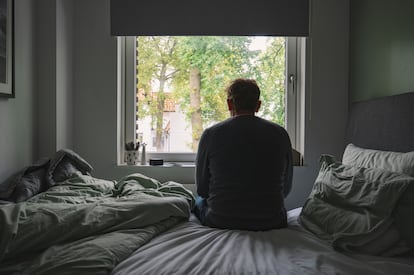How to cope better after a rough night’s sleep
Not getting enough sleep affects many areas of our day-to-day life

There may be several causes, but most of us will have had a rough night’s sleep from time to time: instead of the seven to nine hours recommended by experts in sleep medicine, managing barely five or six. This lack of sleep will have an impact throughout the following day. We are obviously more tired, and this tiredness, this lack of sleep, according to increasing scientific research, affects many areas of our day-to-day life.
“Sleeping fewer hours than recommended for our age interferes with our day-to-day activity. At the cognitive level, it affects our ability to maintain attention, memory and alertness. We have also observed a worse mood, a decrease in optimism and sociability, and increased fatigue and irritability,” says Ana Fernández Arcos, neurologist at the BarcelonaBeta Brain Research Center of the Pascual Maragall Foundation.
If this lack of sleep recurs for several days in a row or becomes chronic, the impact is much more severe. As María José Martínez Madrid, coordinator of the chronobiology working group of the Spanish Sleep Society (SES), points out, sleep deprivation detrimentally affects the immune system, making us more prone to diseases and infections. “Several studies have demonstrated that people who experience sleep deprivation on a regular basis are at a higher risk of developing health problems, such as cardiovascular disease, type 2 diabetes, and mental health disorders such as anxiety or depression,” she explains.
What to avoid after a bad night’s sleep
Given the impact a bad night’s sleep has on our physical and mental capabilities, Fernández Arcos recommends avoiding complex or dangerous undertakings. “We will have poorer response time, longer lapses of attention and poorer memory performance, and we may also be less able to identify errors,” says the expert, who also recommends avoiding awkward conversations or those that could lead to arguments, since there is impaired emotional regulation and poorer impulse control. “We may become more passionate in our arguments than we would be if we had had enough sleep.”
The neurologist also stresses the importance of being prudent when having to drive a vehicle or operate heavy machinery. This is because, after a bad night’s sleep, we usually have “a lower degree of vigilance and alertness, which decreases reaction time and impairs psychomotor coordination, information processing and decision making.” Her opinion is shared by Martínez Madrid, who adds that sleep deprivation is also associated with a decrease in productivity and a greater inclination to make mistakes that can prove fatal in certain work environments. “Chronic sleep deprivation has been associated with a higher risk of occupational accidents — up to 10% of which are due to inadequate sleep — and traffic accidents,” she notes. Indeed, for months the DGT (Spain’s general traffic directorate) has been promoting a communication campaign under the slogan “If you feel sleepy, don’t drive,” stressing that drowsiness is responsible, directly or indirectly, for between 15% and 30% of traffic accidents in Spain. In the same regard, Carlos Egea, president of the Spanish Federation of Medical Sleep Societies (FESMES), explains that driving while drowsy is comparable to driving with a blood alcohol level of 0.10 grams per liter.
On top of all this, if we have had a rough night, Ainhoa Álvarez, clinical neurophysiologist at the Functional Sleep Unit of the Araba Vitoria-Gasteiz University Hospital, recommends avoiding, if possible, making decisions on important issues the next day because insufficient sleep makes us less rational and more impulsive: “Studies conclude that sleep deprivation impairs neural responses to the outcomes of risky decision making, therefore if you are sleep-deprived, it is better not to make important decisions.”
How to get over a bad night’s sleep
However, the effects of a bad night’s sleep can be offset to improve our day significantly. Martínez Madrid stresses the importance of exposure to sunlight and physical exercise to mitigate the effects of a lack of sleep. “Natural light regulates our internal body clock, stimulating the production of hormones such as serotonin during the day, which boosts our mood and energy levels. In addition, physical exercise increases blood circulation and the release of endorphins, which improves attention, mood, and reduces the feeling of fatigue, thereby counteracting the effects of insufficient sleep,” explains the SES spokeswoman, who also points out that it is important to do physical exercise at least two hours before going to bed, since otherwise the acceleration it generates in our organism can make it difficult to fall asleep.
When it comes to work, Fernández recommends leaving tasks that may be more mechanical and require less attention, plus those that require movement, for the hour after lunch, “because it is likely that drowsiness will be at its peak at that time.” In the same regard, Álvarez underlines the importance of understanding our chronotype. In other words, if we are “larks” and tend to be more active early in the day or if, conversely, we are “owls” and are more active in the evening or the night: “By knowing our tendencies, we can organize the tasks that demand more effort for our moments of greatest attention-concentration.”
The answer to the question of whether to have a nap or not is yes, but there are some nuances. A short siesta, between 15 and 30 minutes, is recommended, as a longer nap reduces sleep pressure and can make it more difficult to sleep at night, in addition to causing a worse awakening. “Do not sleep off during the day what you have not slept at night,” sums up Álvarez with a slogan phrase. The same advice is valid for caffeinated beverages. According to the clinical neurophysiologist, they can be useful because they enhance alertness and act as adenosine inhibitors, but it is essential to consume them in moderation and not less than six hours before going to bed.
Finally, the experts also recommend avoiding heavy meals as much as possible, especially for dinner. “A lack of sleep may tempt us to eat foods that are rich in fats and sugars. However, eating heavy meals and unhealthy food can make us feel more drowsy and less concentrated. It is better to choose light and nutritious foods that provide sustained energy, such as fruits, vegetables and proteins,” advises Martínez Madrid.
In any event, contrary to popular belief, lost sleep cannot be made up, but it can be compensated for. Therefore, the best solution to a bad night’s sleep is to get a good night’s sleep the following night, agree the experts consulted. “The most important thing is to understand that having a bad night is not synonymous with never sleeping well again. When faced with sleep deprivation, our brain responds by increasing the deep sleep phase, trying to mitigate the negative effects of sleep deprivation,” explains Álvarez.
In order to get a good night’s sleep after a bad night, Fernández offers some basic sleeping tips. These include trying to put aside thoughts about anything stressful that might have occurred during the day, avoiding the use of mobile devices or other tasks that make us hyper-alert, and going to bed early to get 8-9 hours of restorative sleep.
Sign up for our weekly newsletter to get more English-language news coverage from EL PAÍS USA Edition
Tu suscripción se está usando en otro dispositivo
¿Quieres añadir otro usuario a tu suscripción?
Si continúas leyendo en este dispositivo, no se podrá leer en el otro.
FlechaTu suscripción se está usando en otro dispositivo y solo puedes acceder a EL PAÍS desde un dispositivo a la vez.
Si quieres compartir tu cuenta, cambia tu suscripción a la modalidad Premium, así podrás añadir otro usuario. Cada uno accederá con su propia cuenta de email, lo que os permitirá personalizar vuestra experiencia en EL PAÍS.
¿Tienes una suscripción de empresa? Accede aquí para contratar más cuentas.
En el caso de no saber quién está usando tu cuenta, te recomendamos cambiar tu contraseña aquí.
Si decides continuar compartiendo tu cuenta, este mensaje se mostrará en tu dispositivo y en el de la otra persona que está usando tu cuenta de forma indefinida, afectando a tu experiencia de lectura. Puedes consultar aquí los términos y condiciones de la suscripción digital.









































